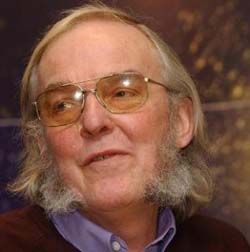Professor Colin T. Pillinger
Colin T. Pillinger, Ph.D., D.Sc., CBE, FRS is Professor of Planetary Sciences and Head of the Planetary and Space Sciences Research Institute, The Open University, UK. He is also Emeritus Professor of Astronomy, Gresham College.
Colin began his career in extraterrestrial sample analysis as part of the NASA Apollo Programme with Co-I and then PI status for lunar sample work. He was appointed PI for the ESA International Rosetta Mission to the Comet Wirtanen. He is currently on a committee of experts advising ESA on its future exploration programme.
He was involved in the NASA Discovery Mission, Genesis, to collect a sample of the solar wind and European Space Agency missions to investigate meteorite erosion effects in space. He was leader of the Beagle 2 project, which aimed to land a spacecraft dedicated to exobiology, geochemistry, and atmospheric science on Mars to seek evidence for past and present life as part of ESA’s Mars Express Mission.
His publications record consists of more than 500 scientific contributions, full papers, abstracts, and communication concerning public awareness of science and he is a regular contributor to TV and radio.
Colin authored Beagle: From Darwin’s Epic Voyage to the British Mission to Mars, My Life on Mars, and Space is a Funny Place. He coauthored The CR chondrite clan, Life on Mars: chemical arguments and clues from Martian meteorites, Mass-independent fractionation of oxygen isotopes during thermal decomposition of carbonates, Bo Xian (LL3.9): Oxygen-isotopic and mineralogical characterization of separated chondrules, and Isotope analysis of oxygen in minerals using Nd/YAG laser-fluorination: the use of stainless-steel wool trap as a fluorine remover.
He was elected to the Fellowship of the Royal Society in (1993) and is a Fellow of the Royal Astronomical Society (FRAS) (1981), the Meteoritical Society (1986), the Royal Geographical Society (1993), and a member of the British Mass Spectrometry Society (1981) and the I.A.U. (1993). He was awarded the CBE in 2003 and Asteroid 15614 was named Pillinger in 2005.
Colin holds a B.Sc with Honors in Chemistry (1965) and a Ph.D. in Mass spectrometry (1968) from the University of Swansea, Wales, and a D.Sc. in Chemistry (1984) from the University of Bristol.
Watch What Are The Dangers Of Finding Life On Other Planets?, Will Science One Day Prove That There’s Life Out There?, The Beagle Missions, Why should someone study science?, and Colin Pillinger.
